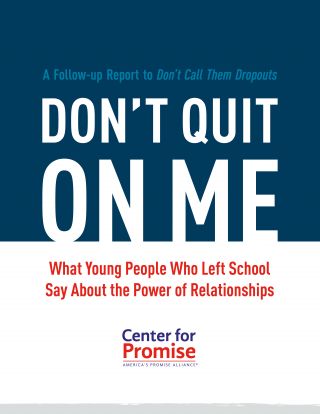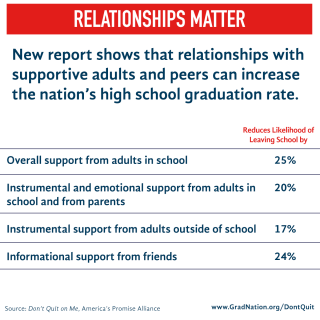Young People, Relationships and the Adversity Cliff
New study examines how supportive relationships can help close graduation gaps.
Posted Sep 17, 2015
Life soon became more severe. Amanda (we've changed her name to protect her identity) became a prostitute and needed help from the police to escape an abusive pimp. Eventually she found a local program that made all the difference, connecting her with supportive adults who provided social and educational services. Today, Amanda has attained her high school degree and is on a road to a better future.
We met Amanda and lots of young people like her in our research for Don’t Quit on Me: What Young People Who Left School Say About the Power of Relationships. Amanda was one of the many young people we surveyed who experienced a level of adversity that ignites an almost daily fight-or-flight response.

Source: Center for Promise
This toxic stress taxes their mental and physical health and soon school becomes irrelevant in their lives. The confluence of homelessness, a catastrophic family health event, physical abuse or neglect leads nearly 500,000 young people to leave school each year without graduating.
Based on this understanding, my colleagues and I at the Center for Promise at Boston University set out to learn if and how supportive relationships can help young people stay in or re-engage with school. We surveyed nearly 3,000 young people and had in-depth conversations with 120 more.
Young people told us that relationships buffer adversity and boost their chances of graduating on time — to a point. We found that:
- Overall support from adults in school reduces the likelihood of young people leaving school by 25 percent. Instrumental support (e.g., shelter, food, clothing, transportation, tutoring) from adults outside of school reduces the likelihood of young people leaving school by 17 percent.
- For young people experiencing medium levels of risk, high support from both parents and adults outside school makes uninterrupted enrollment 11 percentage points more likely than high support from parents alone. Adding a third source of support — friends — boosts likely continuous enrollment by another 5 percentage points.
- But, for young people reporting five or more adverse life experiences, social support alone does little to increase on-time graduation. Uninterrupted graduation stays well below 50 percent even with high support from multiple sources.

Source: Center for Promise
The trauma these young people experience each day inches them closer and closer to an adversity cliff, which many researchers have related to heightened levels of acute and chronic health conditions, drug use, risky sexual behaviors, and leaving school without graduating.
When considering the level of adversity these young people face, the inclination of practitioners and policymakers is to go myopic (No-excuse schools!), go too broad (Eradicate poverty!), or just throw up their hands in defeat (It’s too much!)
I understand. This level of adversity is too much for a parent, teacher, coach or mentor to resolve alone. But that’s no reason for us to quit. The young people facing the most adversity should get the most help. They need intentional, professionalized efforts to resolve trauma, health problems, and social and economic barriers.
Programs such as Communities in Schools, Turnaround for Children, and LIFT help young people strip away the barriers that derail adolescents. They provide mental health services for trauma, housing vouchers for the homeless, and access to other much needed social services. With barriers resolved, young people have the bandwidth to focus on longer-term goals, including school.
Amanda stepped off the cliff, but there were people — teachers, mentors, friends — who grabbed her in time. With lots of the right kind of help, she survived.
With help, Amanda was able to direct her strengths toward the educational goals that can propel her toward her dreams. If that’s what we want for all young people, we can’t quit on those walking precariously close to the edge.
Ret. 10-16-15



No comments:
Post a Comment